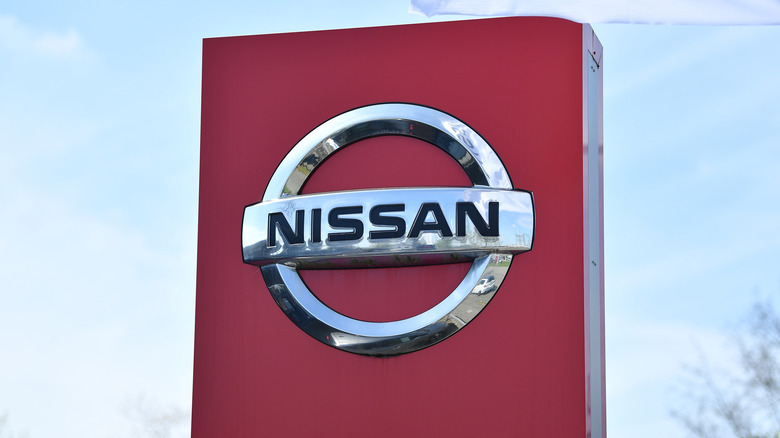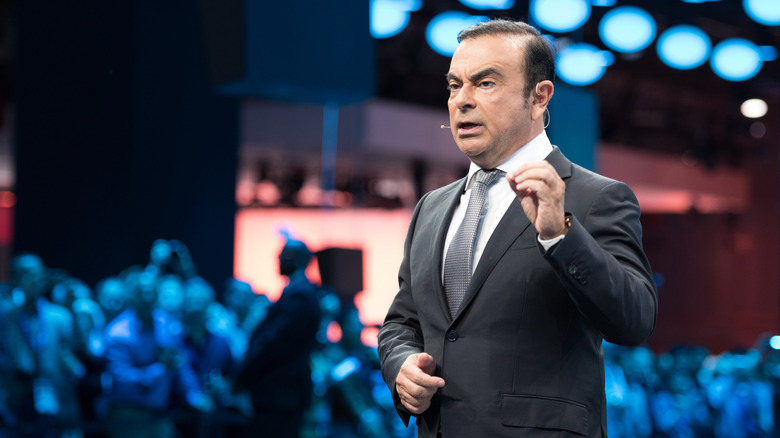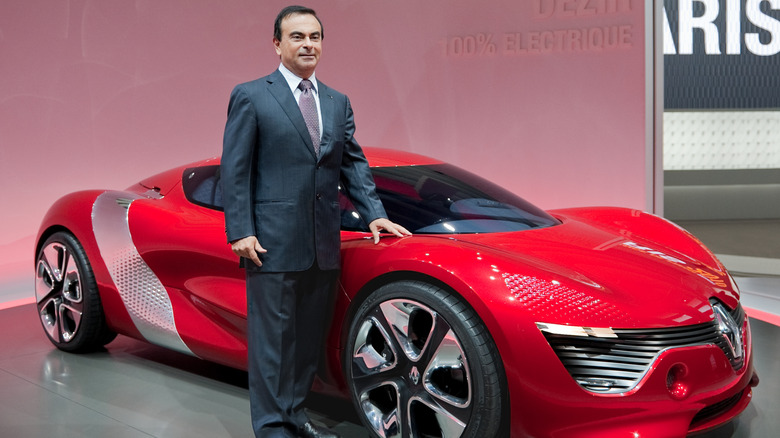This Public Scandal Has To Be The Worst In Nissan's History
The 2020s have thus far proven to be a horrific decade for Nissan. With income rapidly declining, discontinuation of the GT-R halo car, and about 20,000 layoffs as of May 2025, the Japanese automaker hasn't seen a break in a while — but at least it's a better situation than the Carlos Ghosn scandal, an ongoing tale of financial misappropriation, breach of trust, and a daring escape inside a musical instrument box.
The scandal revolves around a combination of various financial fraud accusations levied against one Carlos Ghosn (pronounced 'Gohn'), former head of Nissan, Renault, and Mitsubishi. The accusations claim the disgraced CEO supposedly underreported vast sums of his own salary and organized a complex financial scheme between his personal account, Nissan, and the Middle East. He was arrested on multiple occasions beginning on November 19, 2018, and reportedly faced interrogations for over a hundred days without being allowed a lawyer. Ghosn subsequently posted a 1-billion yen (~8.9 million USD) bail and was placed under house-arrest, where he was constantly monitored via camera feeds outside his home.
With the help of two men posing as musicians, Ghosn finally fled the country to his ethnically-native Lebanon in late-December 2019, stashing himself inside a large box used for musical equipment. Lebanon lacks any extradition treaty with Japan, so he remains an international fugitive. His escape has since borne various labels such as "Mission: Impossible," "Audacious," and more. News stories ballooned around the remarkable case, followed with various Internet memes cycling around his escape, nicknamed the "Carlos Ghosn Challenge." Here's more about the man, the accusations, and his downfall.
Nissan's savior
Carlos Ghosn is credited for saving Nissan from the brink of financial bankruptcy with his aggressive cost-cutting measures and formation of the Nissan-Renault Alliance. In his heyday, the Lebanese-Brazilian found himself as chairman of Nissan, Renault, and chairman of the board at Mitsubishi. In 2017, the year prior to his arrest, he reported 10.6 million vehicles sold under his watch — more than any other manufacturer that year. His actions generally led to widespread praise, with academics and various publications referring to Ghosn as Nissan's "savior."
Preliminary internal plans, codenamed the Nissan Revival Plan, coalesced in 1999 following his appointment. Ghosn implemented broad, sweeping changes in an effort to cut costs, revolving around consolidating parts-suppliers by half and entering partnerships with global suppliers. Furthermore, he slashed manufacturing costs by running fewer lines at greater capacity, maximizing each line's efficiency. This all coincided with his plan to establish the Nissan-Renault and later Nissan-Renault-Mitsubishi Alliance (which retains ownership of Nissan today), further cementing profitability. His plans came into effect in April 2000, one year ahead of schedule, and ultimately saved Nissan from financial ruin.
The Nissan-Renault Alliance played a crucial role in Nissan's turnaround. As part of the deal, Renault assumed $5.4 billion of Nissan's debt in return for a 36.6 equity stake in Nissan. The Japanese company boasted a strong foothold in America, which Renault lacked, though Renault have sold cars stateside before. Renault was well-regarded for innovative designs at the time, marrying well with Nissan's early-2000s quality. In the end, both companies walked away with soaring profits throughout the decade, their winning streak only ending with the 2008 global recession.
The downfall and fallout
Carlos Ghosn was accused of financial misconduct, including under-reporting $44 million of his own salary over the course of several years, and dumping his own personal debts into Nissan to the tune of $16.9 million (1.85 billion yen). He was initially arrested following an emergency five-hour long board meeting, which discussed his personal fate and the future of Nissan's partnerships, and arrested two more times (but never charged) over accusations of filing false pay reports.
Ghosn states that the allegations are entirely baseless throughout his various statements, claiming Nissan was ousting him. From Ghosn's perspective, Nissan feared that France's Renault wanted more control over the Japanese company, so individuals at Nissan orchestrated a plot to prevent its complete merging with Renault. He named Hitoshi Kawaguchi, Hidetoshi Imazu, and Masakazu Toyoda — all high-level Nissan employees, as the primary conspirators. Moreover, he accused Japanese prosecutors and authorities of leaking false information and hiding evidence in an effort to silence Ghosn.
Everything came to a head in December 2019, when Ghosn fled the country to his native Lebanon, traveling first via bullet train and then jet as a stowaway. While he remains a fugitive, the disgraced CEO has since taken proactive steps to restore his name, including a $1 billion lawsuit against Nissan filed in July 2023, with hearings commencing September 2023. Various hearings remain ongoing, including Nissan's own accusations levied against individuals who reportedly aided Ghosn in committing his various crimes. To date, however, no charges have stuck with either party.


